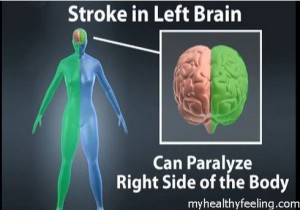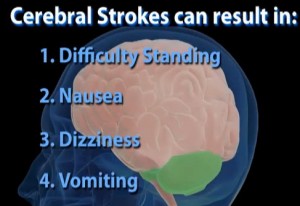A cerebellar stroke may occur when the supply of oxygen and blood to the brain is stopped; this may happen due to blockage or obstruction in the arteries that supply blood to brain. A person may be affected by stroke also due to aneurism burst. Both the conditions may result in death of brain cells and can afflict any region of brain. This can be described as a condition wherein cerebellum may get damaged. Cerebellum is a region at the foot of the brain just above the stem. This cerebellum is responsible for movement and coordination. Immediate neurological treatment is essential as this condition may be life- threatening. In order to treat cerebellar stroke it is essential to determine its prevalence by understanding the symptoms.
Cerebellar Stroke Symptoms
Headache, dizziness, queasiness and vomiting are common symptoms which are seen in many acute and severe diseases and disorders. However, these symptoms may also suddenly occur in case of this type of stroke. Dizziness may be first experienced which is then followed by queasiness and vomiting. Headaches experienced in case of cerebellar stroke are high in intensity and may persist for a longer time and may also be unbearable.
Eye issues:
Eye issues are common in case of cerebellar stroke, this is perhaps due to the fact that cerebellum directs eye movement. Eye related symptom of cerebellar influences only one eye and adds to dizziness. Some of symptomatic eye conditions are nystagmus or tremor of eyeball, ptosis or drooping eyelids, unusual eye movements and contracted eye pupils.
Dysarthria:
This is one of the conditions that may serve as symptom in case of cerebellar stroke. It is a disorder affecting the speech by weakening the facial muscles and respiratory system. The speech may become slurring speech, slow speech, monotonous and rough.
Treatment Recovery of Cerebellar stroke:
Cerebellar stroke treatment may include use of aspirin or injections that may help in breaking up blood clots that may be causing obstructions. This may help significantly and should be adopted as soon as any of the signs of cerebellar symptoms are experienced. Within three hours from the onset of the stroke Tissue Plasminogen Activator abbreviated as TPA or aspirin can be suggested to the patient that may help in dissolving blood clots that caused strokes.
Medications and Surgical Treatment:
It is suggested to consult a doctor and seek medication that may aid in reducing the influence of the disorder. This includes an aspirin routine treatment, which may be suggested along with regimen of blood-thinning drugs and medications to reduce cholesterol level as well as blood pressure. In case of severe blockages in the arteries that supply blood to the brain, doctor may sometimes suggest surgical treatment for the condition.
Physical Therapy:
There are physical therapies that are in fact exercises that may help enhancing strength and flexibility. A certified therapist can tell you exact exercises according to the severity of your cerebellar stroke condition. In case of this stroke a person may have to start learning to walk from the scratch. A person whose mobility and balancing skills are afflicted due to cerebellar stroke, may have to use walking aid such as braces, canes etc.
Preventing stroke:
It is always better to prevent adverse conditions than putting efforts in curing them later. In order to prevent this type of stroke, it is essential to incur some lifestyle changes such as given up bad habits such as smoking, alcohol intake etc. Regular exercises helps in keeping blood circulation appropriate, which may in turn reduce chances of such strokes. Also to add to these good lifestyle habits, one should also follow a strategized diet plan. One should not take cerebellar stroke lightly and should consult doctor as early as possible in order to avoid the condition from maturating.


dear sir my nephew got a accident exactly 2 years back in Goa, he was in coma for 3 weeks & gradually start whisper talking after six months. now as per doctors he cannot stand due to spinal cord injury, & some experts told it is cerebellum problem. pl advice as he still cannot stand on his own.
I am 62 I suferred bilateral cerebeler stroke . I am aproching 2 yrs the reason for the stroke was atrial fib secondery to mi. Infarction I had a quadruple bypasse. And stil have dysarthria and instability in walking when if ever will I regain my speech
Need to understand this kind of Stroke and my pain meds that I taken is impacting this kind of Stroke. 714 486 6023. Please help !!! How serious is this stroke with patients that have had Neck Cancer TONSIL CANCER COPD OPEN HEART SURGERY AND KIDNEY CANCER SCARED.